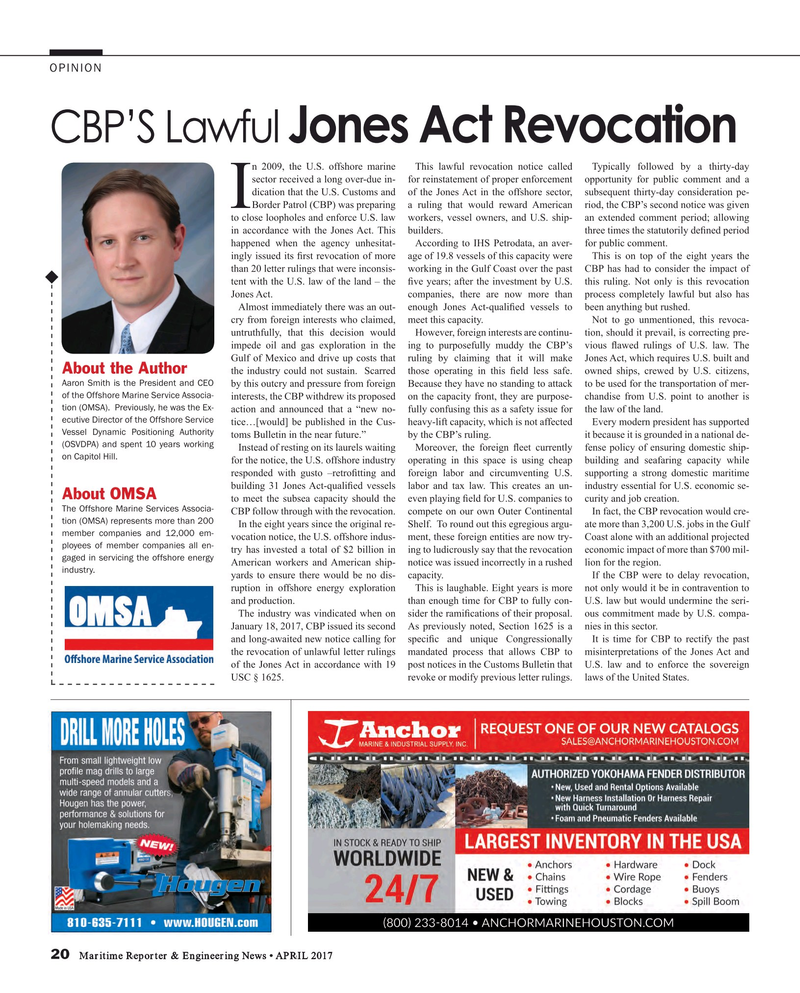
Page 20: of Maritime Reporter Magazine (April 2017)
The Offshore Annual
Read this page in Pdf, Flash or Html5 edition of April 2017 Maritime Reporter Magazine
OPINION
CBP’S Lawful Jones Act Revocation n 2009, the U.S. offshore marine This lawful revocation notice called Typically followed by a thirty-day sector received a long over-due in- for reinstatement of proper enforcement opportunity for public comment and a dication that the U.S. Customs and of the Jones Act in the offshore sector, subsequent thirty-day consideration pe-
IBorder Patrol (CBP) was preparing a ruling that would reward American riod, the CBP’s second notice was given to close loopholes and enforce U.S. law workers, vessel owners, and U.S. ship- an extended comment period; allowing in accordance with the Jones Act. This builders. three times the statutorily de? ned period happened when the agency unhesitat- According to IHS Petrodata, an aver- for public comment. ingly issued its ? rst revocation of more age of 19.8 vessels of this capacity were This is on top of the eight years the than 20 letter rulings that were inconsis- working in the Gulf Coast over the past CBP has had to consider the impact of tent with the U.S. law of the land – the ? ve years; after the investment by U.S. this ruling. Not only is this revocation
Jones Act. companies, there are now more than process completely lawful but also has
Almost immediately there was an out- enough Jones Act-quali? ed vessels to been anything but rushed. cry from foreign interests who claimed, meet this capacity. Not to go unmentioned, this revoca- untruthfully, that this decision would However, foreign interests are continu- tion, should it prevail, is correcting pre- impede oil and gas exploration in the ing to purposefully muddy the CBP’s vious ? awed rulings of U.S. law. The
Gulf of Mexico and drive up costs that ruling by claiming that it will make Jones Act, which requires U.S. built and
About the Author the industry could not sustain. Scarred those operating in this ? eld less safe. owned ships, crewed by U.S. citizens,
Aaron Smith is the President and CEO by this outcry and pressure from foreign Because they have no standing to attack to be used for the transportation of mer- of the Offshore Marine Service Associa- interests, the CBP withdrew its proposed on the capacity front, they are purpose- chandise from U.S. point to another is tion (OMSA). Previously, he was the Ex- action and announced that a “new no- fully confusing this as a safety issue for the law of the land. ecutive Director of the Offshore Service tice…[would] be published in the Cus- heavy-lift capacity, which is not affected Every modern president has supported
Vessel Dynamic Positioning Authority toms Bulletin in the near future.” by the CBP’s ruling. it because it is grounded in a national de- (OSVDPA) and spent 10 years working
Instead of resting on its laurels waiting Moreover, the foreign ? eet currently fense policy of ensuring domestic ship- on Capitol Hill. for the notice, the U.S. offshore industry operating in this space is using cheap building and seafaring capacity while responded with gusto –retro? tting and foreign labor and circumventing U.S. supporting a strong domestic maritime building 31 Jones Act-quali? ed vessels labor and tax law. This creates an un- industry essential for U.S. economic se-
About OMSA to meet the subsea capacity should the even playing ? eld for U.S. companies to curity and job creation.
The Offshore Marine Services Associa-
CBP follow through with the revocation. compete on our own Outer Continental In fact, the CBP revocation would cre- tion (OMSA) represents more than 200
In the eight years since the original re- Shelf. To round out this egregious argu- ate more than 3,200 U.S. jobs in the Gulf member companies and 12,000 em- vocation notice, the U.S. offshore indus- ment, these foreign entities are now try- Coast alone with an additional projected ployees of member companies all en- try has invested a total of $2 billion in ing to ludicrously say that the revocation economic impact of more than $700 mil- gaged in servicing the offshore energy
American workers and American ship- notice was issued incorrectly in a rushed lion for the region. industry. yards to ensure there would be no dis- capacity. If the CBP were to delay revocation, ruption in offshore energy exploration This is laughable. Eight years is more not only would it be in contravention to and production. than enough time for CBP to fully con- U.S. law but would undermine the seri-
The industry was vindicated when on sider the rami? cations of their proposal. ous commitment made by U.S. compa-
January 18, 2017, CBP issued its second As previously noted, Section 1625 is a nies in this sector. and long-awaited new notice calling for speci? c and unique Congressionally It is time for CBP to rectify the past the revocation of unlawful letter rulings mandated process that allows CBP to misinterpretations of the Jones Act and of the Jones Act in accordance with 19 post notices in the Customs Bulletin that U.S. law and to enforce the sovereign
USC § 1625. revoke or modify previous letter rulings. laws of the United States. 20 Maritime Reporter & Engineering News • APRIL 2017
MR #4 (18-25).indd 20 MR #4 (18-25).indd 20 4/5/2017 4:12:15 PM4/5/2017 4:12:15 PM

 19
19

 21
21
